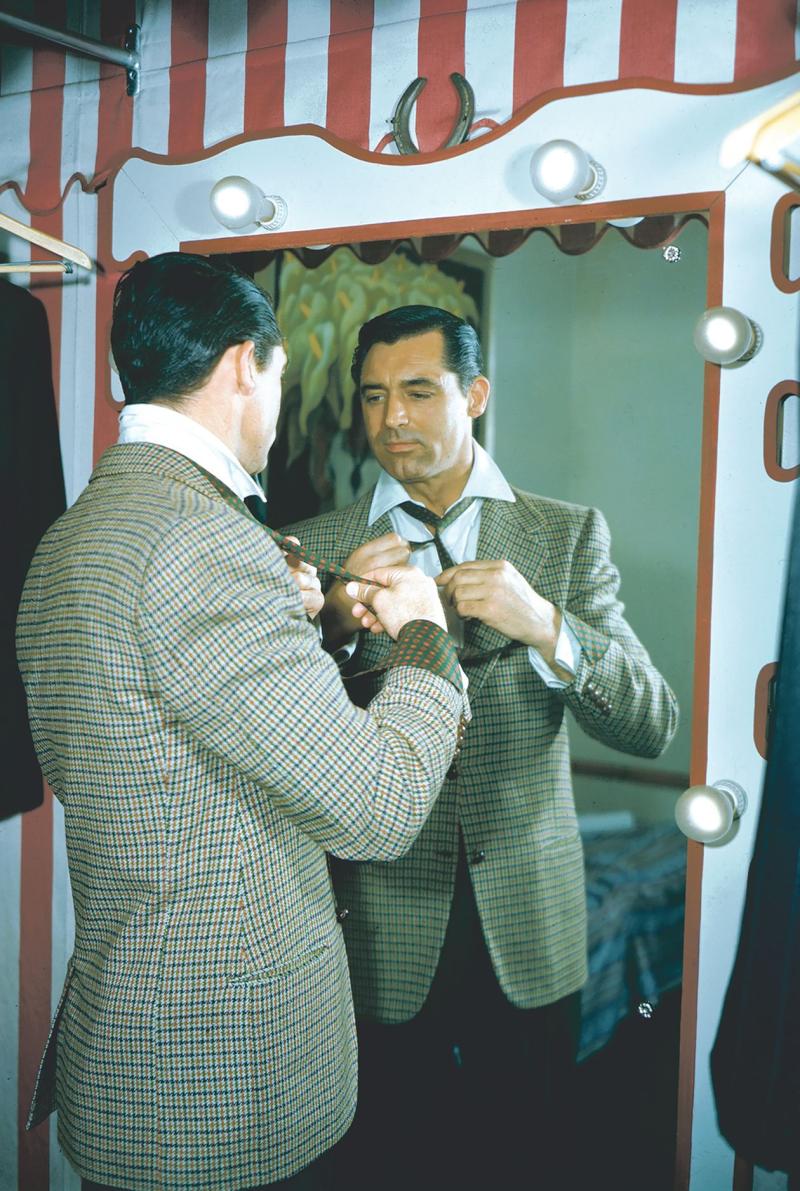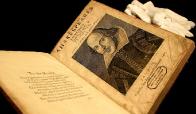'Cary Grant: A Brilliant Disguise' Review: The Enigma of Charisma
By: Joseph Epstein (WSJ)



H.L. Mencken was doubtful that Shakespeare wrote the plays assigned to him because there is substantial evidence that he acted in them, which is an amusing way of saying that actors are not notable for searing intelligence. Their intelligence and much else about famous movie actors was nicely kept under cover during the years, from the 1930s through the early 1960s, of the studio system in Hollywood. The men who ran the great studios—MGM, Fox, Warner Bros., Paramount—knew that the people went to the movies above all to see their favorite actors, and so the actors had to be protected from showing themselves the coarse, ignorant, foolish beings they often were. The studio bosses did this by controlling the interviews their actors gave, restraining them from making political statements, hiding anything peculiar about their sex lives. Actors were where the money was, the vehicles in which the movie business drove all the way to the bank.
One reads about the off-screen lives of actors at the peril of never again being able to enjoy in quite the same innocent way the movies they made. In “Conversations With Wilder” (1999) one learned, to one’s regret, that Humphrey Bogart wore a hairpiece, needed special lighting arrangements when filmed because he spat when he spoke, and was an anti-Semite. “I get along very, very well with actors,” Billy Wilder avers, “except when I work with sons-of-bitches like Mr. Bogart.” After reading this, “Casablanca,” “The Maltese Falcon” and “The African Queen” no longer seem the uncomplicated, joyous entertainments they formerly were.
For this reason, I began Scott Eyman’s biography of Cary Grant with some trepidation. In his movies Cary Grant was the embodiment of suavity, the master of savoir faire, elegant, witty, in every way winning. He was dazzlingly but somehow inoffensively (to men) handsome, for in most of his movies he won over women not by his good looks but by his bumbling yet invincible charm. Would Cary Grant, too, in so-called real life, turn out to be a jerk, a creep, a monster, another disappointment? I, for one, distinctly preferred not.
Cary Grant was born Archibald Alexander Leach in 1904 in Bristol, England, to an alcoholic working-class father (he was a tailor’s presser) and a mother who spent more than 20 years in a mental institution. In Mr. Eyman’s account, Grant, an only child largely ignored by his parents, “would spend the rest of his life coping with the damage inflicted on him during these years,” harassed all his days by unreasonable fear and uncertainty.
The young Archie Leach left school at 14—actually, he was kicked out—and found succor in Bristol’s music halls, the English version of our vaudeville, with a touch of bawdiness added. He soon acquired low-level work among some of the performers and not long after joined a troupe of tumblers, with whom he did acrobatics, stilts-walking and pantomime. The troupe traveled to America, where it played second- and third-line theaters, and when it returned to England the young Archie Leach chose not to return with it.
He found a place acting in B-minus movies in New York, then traveled out to Hollywood, where he gradually found parts in better movies. In 1931 he had his name changed to Cary Grant—or, as Mr. Eyman puts it, “the matchless specimen of masculine charm known as Cary Grant.” A friend of Grant’s once told him, “I always wanted to be Cary Grant,” to which he replied, “So did I.” The subtitle of “Cary Grant” is “A Brilliant Disguise.”
What was disguised underneath Grant’s nonchalant aristocratic facade, according to Mr. Eyman, “was a personality of nearly perpetual anxiety.” Grant was a man who had no fewer than five marriages (he remarked late in life that he was a better judge of scripts than wives), spent much of his life in therapy, once attempted suicide, and claimed LSD (which he had taken under supervision more than 100 times) to be a wonder drug that quieted the rumblings in his soul and becalmed him by revealing his true self to him.
Whatever the rich complications in his personal life, Cary Grant was never less than keen about cultivating his professional life. He was sedulous about his personal appearance. He worked daily on his perfect tan. His clothes were, beyond impeccable, perfection. Never rumpled, even when chased by an airplane through a farm field or climbing Mount Rushmore, he was often on Ten Best-Dressed Men lists, and the other nine men, whoever they were, must all have felt themselves more than a touch shabby compared with him. “I consider him not only the most beautiful but the most beautifully dressed man in the world,” said Edith Head, the fabled Hollywood costume designer.
Over his 40-year career, Grant made 73 movies. More than a few dogs were among them: He much disliked his performance in “Arsenic and Old Lace”; his role in “Mr. Lucky” was itself not very lucky; and he was sadly miscast as the Midwestern Cole Porter in “Night and Day.” But he scored with an unusually high percentage of winners, for many of which he was able to arrange not only an impressively high salary but a serious share of the gross.
Romantic comedy was Cary Grant’s specialty. “Grant was to romantic comedy,” Mr. Eyman writes, “what Fred Astaire was to dance—he made something extremely difficult look easy.” Grant recognized that the key to comedy was in timing, and his own timing, first learned on the English music-hall stage, was consummate. He knew his strengths and limitations and kept his ambition in bounds. William Wilkerson III, son of the founder of the Hollywood Reporter, noted that Grant “was one of the few English actors who had no desire to play Shakespeare.” He avoided glum parts generally, sensing, correctly, that movie audiences had no interest in seeing him, in a wife-beater undershirt, screaming “Stella!”
Grant understood that a key to success for an actor in Hollywood was to work with the best directors. For the most part, he was able to arrange to do so. He worked in films directed by Leo McCarey, Howard Hawks, George Stevens, George Cukor and Alfred Hitchcock. Given his popularity at the box office, he had, as Mr. Eyman writes, “first crack at nearly every script that didn’t involve a cattle drive or space aliens.”
Equally careful about female co-stars, Grant played in movies with Katharine Hepburn, Irene Dunne, Audrey Hepburn, Grace Kelly and Ingrid Bergman. He especially admired Bergman. “Grant found that he liked Ingrid Bergman a great deal,” Mr. Eyman notes. “She was beautiful, but lots of actresses are beautiful. What made Bergman special was her indifference to her looks, her clothes, to everything except her art.” With Bergman he made “Notorious,” “the high-water mark,” according to Mr. Eyman, “of the Hitchcock-Grant collaborations.”
An old Hollywood hand who has written books on John Wayne, Louis B. Mayer, Cecil B. DeMille, James Stewart and Henry Fonda, among others, Mr. Eyman supplies what feels like the “true gen”—the real lowdown—on the directors, producers and studio heads with whom Cary Grant worked. He is up on the complex, even arcane, manipulations of Hollywood finance and is able to explain them lucidly. He knows not only where the bodies are buried but also who buried them. He also has a fine ear for gossip.
The first bit of Hollywood gossip I heard as a movie-going kid in the far hinterland of Chicago was that Randolph Scott was gay. Not long after I had heard that Cary Grant had moved in with Scott. Then, squelching both bits of scuttlebutt, someone told me that neither man was gay but that both were among the cheapest men in Hollywood and lived together not for sexual reasons but to save money on rent.
Moss Hart reported that if he stayed at Grant’s house for more than a few days he was presented with a bill for phone calls, laundry and other incidentals. Mel Brooks, who had an office adjacent to Grant’s at Universal, and who began with a slobbering fan-like admiration for him, after a few lunches together dismissed him as a schnorrer—Yiddish for freeloader, beggar, cheapskate—and ceased taking his phone calls. For his only child—his daughter Jennifer, by his fourth wife, Dyan Cannon—and a few friends, Grant would reach into his back pocket, remove his wallet, freeing the moths that had gathered there, and spend lavishly, but otherwise the moths remained undisturbed.
Early in his biography, Mr. Eyman reports that “gays have been eager to claim Grant as one of their own, while straights have been every bit as insistent about his presumed heterosexuality.” Grant, it appears, played, in Jerry Seinfeld’s phrase, on both teams. Arthur Laurents, the playwright and director, claimed that “Cary Grant was at least bisexual.” The English actress Sue Lloyd once saw Grant at a party “swishing around” in a kaftan and was struck by the contrast between this and his stern side as a hardened businessman. Randolph Scott characterized his and Grant’s relationship as “locker-room playing around,” nothing more.
According to a friend named Bill Royce, Grant, in Mr. Eyman’s words, “didn’t think homosexual acts were anything to ashamed of, or, for that matter, proud of. They simply were—part of the journey, not necessarily the final destination.” But, then, the English have always been more casual about homosexuality than we gringos, as witness so many gay relationships at English public schools and Oxbridge (when they weren’t co-educational institutions), later easily abandoned for heterosexual life. The English attitude toward sexuality generally seems perhaps best captured in the refrain line from the old sea shanty: “. . . if you can’t find a woman, get a clean old man.”
We are left with the brilliance of Cary Grant’s performances in his best movies, which all the details of his personal life do not ultimately diminish. Mr. Eyman writes of the dazzling ambiguities in Grant’s movie roles, where he could seem, simultaneously, amusing yet amused, aristocratic yet comically undignified, sexy yet never predatory. Pauline Kael, whom Mr. Eyman quotes in his final pages, perhaps captures Cary Grant’s stellar quality best: “He was the Dufy of acting—shallow, but in a good way, shallow without trying to be deep. We didn’t want depth from him; we asked only that he be handsome and silky and make us laugh.” This he was and did in so many of his best movies, movies that continue to please today, more than 50 years after he made them.
—Mr. Epstein is the author of “Charm: The Elusive Enchantment.”

 Article is LOCKED by author/seeder
Article is LOCKED by author/seeder




I thought that Cary Grant was more that a movie star - a legitimate male role model However this book is about charm.
We all know those who have it.
The book is:
CARY GRANT: A BRILLIANT DISGUISE
By Scott Eyman
Simon & Schuster, 556 pages
Interesting post. I remember enjoying his movies as a kid. It's always interesting to see beneath the mask. Thanks.
My pleasure
"... actors are not notable for searing intelligence." I guess Hedy Lamarr was an exception.
"Humphrey Bogart.....was an anti-Semite." Strange, then, that he lived so many years until his death married to a Jewess, Lauren Bacall, both of whose parents were Jews.
Not so surprising. That stuff is not so rare. Van Jones is married to a white woman and he's not too fond of whites.